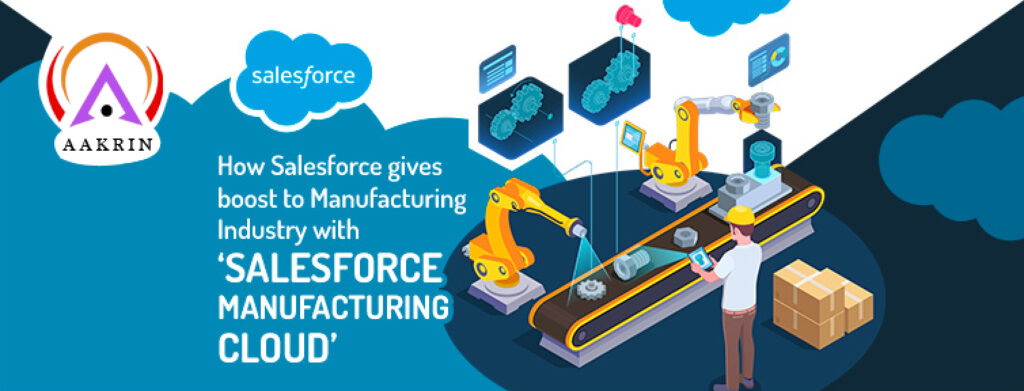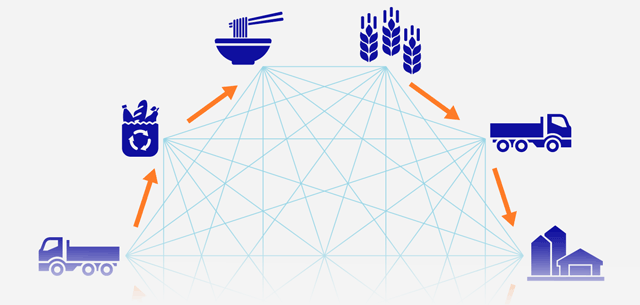
What is Salesforce Manufacturing Cloud?
Introduction: In the dynamic landscape of manufacturing, staying ahead requires more than just efficient production processes. Salesforce Manufacturing Cloud emerges as a game-changer, tailored specifically for the unique challenges of the manufacturing industry. In this blog post, we’ll explore what Salesforce Manufacturing Cloud is, why it’s invaluable to businesses, and its key features that revolutionize manufacturing operations.
Understanding Salesforce Manufacturing Cloud:
Salesforce Manufacturing Cloud is a specialized CRM (Customer Relationship Management) platform designed to empower manufacturing companies. It enables businesses to align sales and operations, improve collaboration, and gain real-time visibility into their supply chain. By harnessing the power of data and analytics, manufacturing organizations can optimize production, reduce costs, and enhance customer satisfaction.

Why is Salesforce Manufacturing Cloud Useful for Your Business?
1. Streamlined Operations:
- End-to-End Visibility: Gain real-time insights into every stage of the manufacturing process, enabling proactive decision-making.
- Supply Chain Optimization: Improve supply chain efficiency by predicting demand, optimizing inventory levels, and ensuring timely deliveries.
2. Enhanced Collaboration:
- Sales and Operations Alignment: Seamlessly align sales forecasts with production plans, ensuring that production meets market demand.
- Cross-Departmental Collaboration: Facilitate communication between sales, production, and logistics teams, fostering a collaborative work environment.
3. Data-Driven Insights:
- Predictive Analytics: Utilize predictive analytics to forecast demand, enabling better resource allocation and inventory management.
- Performance Metrics: Monitor key performance indicators (KPIs) to measure production efficiency, identify bottlenecks, and implement process improvements.
4. Improved Customer Satisfaction:
- Accurate Order Fulfillment: Ensure accurate and timely order fulfillment, leading to higher customer satisfaction and repeat business.
- Customization Capabilities: Tailor products and services based on customer preferences and market demands, enhancing customer experience.



Key Features of Salesforce Manufacturing Cloud




1. Sales Agreements:
- Unified View: Centralized view of all sales agreements, ensuring that production aligns with committed volumes and timelines.
- Automated Updates: Automated updates on order status and changes, minimizing manual errors and miscommunications.
2. Account-Based Forecasting:
- Account-Level Insights: Detailed insights into customer behavior and preferences, enabling accurate demand forecasting.
- Sales Collaboration: Collaboration tools for sales teams, facilitating data sharing and demand prediction discussions.
3. Inventory Management:
- Real-Time Inventory Tracking: Real-time visibility into inventory levels, preventing overstocking or stockouts.
- Order Prioritization: Intelligent prioritization of orders based on inventory levels and production capacity, optimizing order fulfillment.
4. Supply Chain Analytics:
- Demand Sensing: Utilize AI-driven demand sensing to anticipate market demands, ensuring proactive adjustments in production plans.
- Supplier Collaboration: Collaborate with suppliers based on demand forecasts, enhancing supply chain efficiency and reducing lead times.
who will use Salesforce Manufacturing Cloud
Salesforce Manufacturing Cloud is specifically designed to cater to the unique needs of manufacturing companies across various industries. The platform is intended for use by a range of professionals and teams within these manufacturing organizations, including
- Sales Teams: Sales representatives and managers can use Manufacturing Cloud to gain insights into customer demands, track sales agreements, and collaborate with production teams to align sales forecasts with production plans.
- Operations Teams: Manufacturing Cloud provides valuable tools for operations managers and teams to optimize production processes, monitor inventory levels, and ensure efficient allocation of resources. They can utilize the platform to streamline workflows and enhance overall operational efficiency.
- Supply Chain Professionals: Professionals involved in supply chain management, including procurement managers and logistics coordinators, can use Manufacturing Cloud to collaborate with suppliers, manage inventory levels, and improve demand forecasting. This ensures a smooth flow of materials and products throughout the supply chain.
- Finance and Planning Teams: Finance professionals can utilize Manufacturing Cloud’s analytics and forecasting features to gain insights into financial performance, track costs, and plan budgets based on production forecasts. This helps in strategic financial planning for the organization.
- Customer Service Teams: Customer service representatives can access Manufacturing Cloud to view customer order status, track deliveries, and provide accurate information to customers regarding their orders. This enhances customer satisfaction and ensures timely communication with clients.
- Executives and Decision-Makers: C-level executives and decision-makers can utilize Manufacturing Cloud’s analytics and reporting capabilities to gain high-level insights into the company’s overall performance. They can use these insights to make data-driven decisions, identify trends, and formulate strategic plans for the organization’s growth.




Salesforce Manufacturing Cloud offers extensive benefits to manufacturers, enhancing their business operations significantly. Here’s a simplified breakdown of its key features:
- Purchase and Sales Agreement Management:
- Helps you manage contracts efficiently.
- Enables easy tracking of target volumes and revenue.
- Provides detailed client profiles and simplifies renewal workflows.
- Efficient Problem Handling:
- Integrates with Service and Sales Clouds for focused customer support.
- Utilizes call routing to resolve customer queries promptly.
- Uses metrics for comprehensive insights into customer satisfaction and common issues.
- Accurate Forecasting and Reporting:
- Allows precise forecasting of consumer lifecycle stages and sales opportunities.
- Provides intelligent reporting to understand customer needs for better personalization.
- Advanced Analytics:
- Integrates with existing ERP systems for comprehensive order data.
- Utilizes Einstein analytics for in-depth insights into account trustworthiness, compliance, and product performance.
- Helps identify problems, opportunities, high-growth sectors, and valuable accounts quickly.
- Enhanced Customer Experience:
- Tracks user details and identifies cross-selling opportunities.
- Enables customization of manufacturing, marketing, and sales strategies for better customer experiences.

In summary, Salesforce Manufacturing Cloud is a collaborative platform that brings together various departments within manufacturing organizations. By providing a unified view of sales, operations, and supply chain data, it facilitates seamless communication and collaboration among different teams, leading to improved efficiency, better decision-making, and enhanced customer satisfaction.

